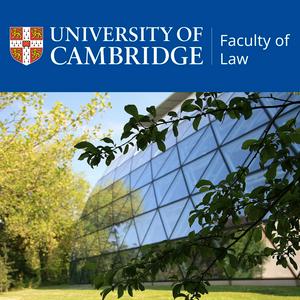Public Lectures from the Faculty of Law, University of Cambridge
Faculty of Law, University of Cambridge

Último episódio
529 episódios
- Speakers: Prof Mads Andenas & Prof Johann Ruben Leiss, University of Oslo
Lecture summary: The lecture explores the systemic function of general principles in international law in light of the ongoing work of the ILC on general principles of law and recent practice of international courts and tribunals, such as the Climate Change Advisory Opinion of the International Court of Justice from 2025. In its first part, the lecture examines the ILC’s approach to the systemic function of general principles and comments of states on the ILC’s work. In its second and third part, the lecture discusses the two main features of the systemic function of general principles, namely their contribution to inter-norm and inter-systemic coherence in international law. All general principles potentially fulfil a systemic function by their gap-filling role and inter-systemic communication through Article 38(1)(c) ICJ Statute. Several general principles have a systemic pull in inter-norm contexts as interpretative guidelines and inter-norm harmonisers and coordinators. In the relationship between different (sub)orders of international law (including European law and national legal orders applying international law), several principles provide for ‘hinge’ mechanisms and inter-system harmonisers which open legal (sub)orders to one another, and integrate them into (relative) unity, while others serve as inter-system coordinators or mechanisms for conditional closure of legal orders. This means, all general principles have a systemic function, whereas certain principles have more direct systemic function by virtue of their normative content. Through their systemic function, general principles contribute as a central cohesive force furthering international law’s character as a legal and (relative) unitary system. This system is characterized by a complex and dynamic interplay between a plurality of legal norms, orders, and sub-orders, including national legal orders, through systemic principles of openness, coordination, and conditional closure.
Chair: Prof Campbell McLachlan
This lecture was given on 6 February 2026 and is part of the Friday Lunchtime Lecture series at the Lauterpacht Centre. - Speaker: Dr Poorna Mysoor, CIPIL, University of Cambridge
Biography: Dr Poorna Mysoor is a Fellow in Law at Lucy Cavendish College, University of Cambridge. She was a Leverhulme Trust Early Career Fellow at Oxford Law Faculty. She is the author of two books, Copyright as Personal Property (2025) and Implied Licences in Copyright Law (2021), both published with Oxford University Press, and of other peer reviewed journals articles. Poorna obtained her undergraduate law degree at NLSIU, Bangalore, LLM from SOAS, University of London and DPhil from Oxford Law Faculty. Before embarking on her doctorate, Poorna practised intellectual property law for several years in Hong Kong and was a litigator in India.
Abstract: Many scholars argue that recognising copyright as a property right leads to expansion. The argument is that property rights empower the owners disproportionately with little regard to the interests of other stakeholders. In this presentation the speaker seeks not only to debunk this argument to show instead the limiting role played by property rights and its impact on copyright. Drawing from her recently published monograph, ‘Copyright as Personal Property’ the speaker will put forward relevant analogies from land law and personal property law in support of her arguments. She seeks to demonstrate tat copyright expansion can indeed be reined in by adopting, and not disregarding, the property framework in the characterisation of copyright.
For more information see:
https://www.cipil.law.cam.ac.uk/seminars-and-events/cipil-seminars Chilling Effects: Repression, Conformity, and Power in the Digital Age: CIPIL/CPL Lunchtime Seminar
04/2/2026 | 41minSpeaker: Professor Jon Penney (Osgoode Hall Law School, York University, Toronto)
In this talk, Jon Penney explores key themes from his new book Chilling Effects: Repression, Conformity, and Power in the Digital Age (Cambridge University Press, 2025), which examines the increasing weaponization of surveillance, censorship, and new technology to repress and control us. With corporations, governments, and extremists employing big data, artificial intelligence, FRT, cyber-mobs, and other technological threats to limit our rights and freedoms, concerns about chilling effects—or how these activities deter us from exercising our rights—have become urgent. Penney draws on law, privacy theory, and social science to present a new conformity theory that highlights the dangers of chilling effects and their potential to erode democracy and enable a more illiberal future. Following the book’s urgent and timely message, he sheds light on the repressive and conforming effects of technology, state, and corporate power and offers a roadmap of how to respond to their weaponization today and tomorrow.
Biography: Jon Penney is a legal scholar and social scientist at Osgoode Hall Law School, York University, Toronto, where he is an Associate Professor and holds the York Research Chair in Artificial Intelligence, Data Governance, and the Law. He is also a Faculty Associate at Harvard’s Berkman Klein Center for Internet & Society and Senior Research Fellow at the University of Toronto’s Citizen Lab. His award-winning research on privacy, technology, and human rights has received national and international attention, including coverage in the Washington Post, the New York Times, Reuters International, The Guardian, and Le Monde, among others, and has been profiled in WIRED and Harvard Magazine.
For more information see:
https://www.cipil.law.cam.ac.uk/seminars-and-events/cipil-seminars
https://www.cpl.law.cam.ac.uk/- Speaker: Tim Pitt-Payne KC, 11 Kings Bench Walk
Biography: Timothy Pitt-Payne KC is a leading information law silk based at 11KBW where he has practiced since 1990. He was appointed QC/KC in 2010. His information law practice involves both litigation and advisory work in data protection, freedom of information, access to environmental information, RIPA, human rights issues, privacy, and breach of confidence. His clients have included commercial organisations, the Information Commissioner, numerous regulators, NHS bodies, local authorities, Universities, and private individuals. He has extensive advocacy experience in information law, at all levels from the First-tier Tribunal to the Supreme Court. In addition to information law, he is also active in both public law and employment law.
Abstract: Article 22 of the UK GDPR prohibits certain forms of decision-making based solely on automated processing of personal data. This presentation considers the significance, scope, meaning and justification of Article 22 (as recently amended by the Data (Use and Access) Act 2025). It argues that the provision should remain as part of the UK GDPR, although its scope may require modification. The provision is an outlier within the UK GDPR, in that it is focused specifically on decision-making, rather than on the full range of ways in which personal data can be processed. It applies to decision-makers in both the public and private sector. Much of the debate about the implications of automated decision-making has been focused on decision-making by judges or by public authorities; Article 22 is much wider in scope, with extensive impact on the private sector. I address some of the interpretative difficulties raised by Article 22. For instance, what minimum level of human involvement is required by Article 22? To what extent are any interpretative difficulties resolved by the recent amendments? In relation to the justification for Article 22, I assess possible arguments based on transparency, bias, responsiveness to individual circumstances, and risks of error. I argue that the most convincing justification is based on non-consequentialist arguments broadly relating to human dignity, founded on claims about inherent differences between human and machine capabilities.
For more information see:
https://www.cipil.law.cam.ac.uk/seminars-and-events/cipil-seminars The Future of the European Convention on Human Rights in the United Kingdom: CELS/CPL/LCIL Roundtable
03/2/2026 | 1h 40minThe Centre for European Legal Studies (CELS), The Centre for Public Law (CPL) and the Lauterpacht Centre for International Law (LCIL) held a roundtable event on 'The Future of the European Convention on Human Rights in the United Kingdom' on 21 February 2026.
The European Convention on Human Rights (ECHR) remains one of the most significant instruments of human rights protection in Europe. Yet in the United Kingdom, its place in the constitutional order is increasingly contested. Political debate has raised questions about the appropriateness of the ECHR's reach, its domestic incorporation through the Human Rights Act 1998, and the proper balance between parliamentary sovereignty and Strasbourg supervision.
The aim of this roundtable was to bring together Cambridge academics to consider possible trajectories for reform and the mechanisms to achieve this. The discussion provided a space not only for doctrinal and legal analysis but also for assessing political realities and potential path. The roundtable started from the perspective that there is a perception, very strong in some quarters, that the ECHR is not fit for purpose.
Chair: Catherine Barnard
Nabil Khabirpour
Jan Klabbers
Marcus Gehring
Chair: Sandesh Sivakumaran
Darren Peterson
Stevie Martin
For further information:
CELS: https://www.cels.law.cam.ac.uk/
CPL: https://www.cpl.law.cam.ac.uk/
LCIL: https://www.lcil.cam.ac.uk/
Mais podcasts de Ensino
Podcasts em tendência em Ensino
Sobre Public Lectures from the Faculty of Law, University of Cambridge
The Faculty of Law has a thriving calendar of lectures and seminars spanning the entire gamut of legal, political and philosophical topics. Regular programmes are run by many of the Faculty's Research Centres, and a number of high-profile speakers who are leaders in their fields often speak at the Faculty on other occasions as well.
Audio recordings from such events are published in our various podcast collections. Video recordings are available via YouTube.
Site de podcastOuça Public Lectures from the Faculty of Law, University of Cambridge, All Ears English Podcast e muitos outros podcasts de todo o mundo com o aplicativo o radio.net

Obtenha o aplicativo gratuito radio.net
- Guardar rádios e podcasts favoritos
- Transmissão via Wi-Fi ou Bluetooth
- Carplay & Android Audo compatìvel
- E ainda mais funções
Obtenha o aplicativo gratuito radio.net
- Guardar rádios e podcasts favoritos
- Transmissão via Wi-Fi ou Bluetooth
- Carplay & Android Audo compatìvel
- E ainda mais funções


Public Lectures from the Faculty of Law, University of Cambridge
Leia o código,
baixe o aplicativo,
ouça.
baixe o aplicativo,
ouça.




































